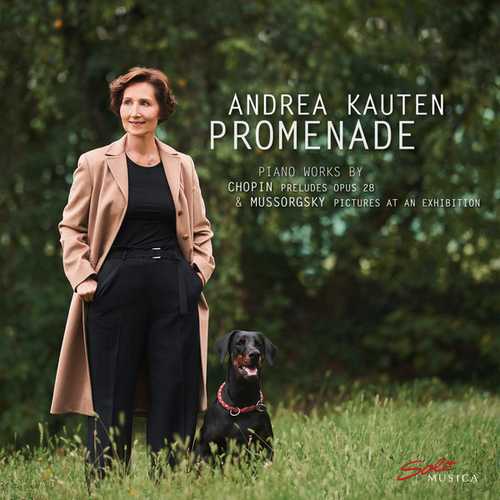
Composer: Frédéric Chopin, Modest Mussorgsky
Performer: Andrea Kauten
Format: FLAC (tracks)
Label: Solo Musica
Release: 2021
Size: 646 MB
Recovery: +3%
Scan: yes
Chopin: Preludes (24), Op. 28
01. No. 1 in C Major, B. 124
02. No. 2 in A Minor, B. 123
03. No. 3 in G Major, B. 107
04. No. 4 in E Minor, B. 123
05. No. 5 in D Major, B. 107
06. No. 6 in B Minor, B. 107
07. No. 7 in A Major, B. 100
08. No. 8 in F-Sharp Minor, B. 107
09. No. 9 in E Major, B. 107
10. No. 10 in C-Sharp Minor, B. 123
11. No. 11 in B Major, B. 107
12. No. 12 in G-Sharp Minor, B. 107
13. No. 13 in F-Sharp Major, B. 107
14. No. 14 in E-Flat Minor, B. 107
15. No. 15 in D-Flat Major, B. 107 “Raindrop”
16. No. 16 in B-Flat Minor, B. 107
17. No. 17 in A-Flat Major, B. 100
18. No. 18 in F Minor, B. 107
19. No. 19 in E-Flat Major, B. 107
20. No. 20 in C Minor, B. 107
21. No. 21 in B-Flat Major, B. 123
22. No. 22 in G Minor, B. 107
23. No. 23 in F Major, B. 107
24. No. 24 in D Minor, B. 107
Mussorgsky: Pictures at an Exhibition
25. Promenade I
26. I. Gnomus
27. Promenade II
28. II. Il vecchio castello
29. Promenade III
30. III. Tuileries (Dispute d’enfants après jeux)
31. IV. Bydło
32. Promenade IV
33. V. Ballet of Unhatched Chicks in Their Shells
34. VI. Samuel Goldenberg and Schmuÿle
35. Promenade V
36. VII. Limoges, le marché (La grande nouvelle)
37. VIIIa. Catacombæ (Sepulcrum romanum)
38. VIIIb. Con mortuis in lingua mortua
39. IX. The Hut on Fowl’s Legs [Baba-Yagá]
40. X. The Great Gate of Kiev
“The new Solo Musica recording “”Promenade”” of Frédéric Chopin’s Préludes op. 28 and Modest Mussorgsky’s “”Pictures at an Exhibition”” brings together two prominent piano cycles that are almost emblematic of their creators’ oeuvre. In the juxtaposition, pianist Andrea Kauten shows what unites them despite all the expected contrasts, which goes far beyond some obvious references by Mussorgsky to Chopin’s Préludes. Both large-scale cycles combine miniatures of partly aphoristic character. They stand in the tension between European art music and the national influences of Eastern European and Slavic traditions. For the time being, they seek different solutions. The cosmopolitan Chopin, rejecting any demonstrative patriotism, manages the seamless integration of his Polish idiom into a universally European expression. Mussorgsky, as a self-confessed post-cosmopolitan, emphatically recalled the folk-Russian, which he offensively opposed to everything “”Western””. Both composers found their way to a personalised musical language which, while freely handling the form, allows the traditional harmonies to be broken up by deliberate instabilities. Both meet on the path to modernity. Even if emotional exhibitionism was alien to both composers and the works can only be related to the biographical snapshots of their genesis with extreme caution: Both cycles are set against the background of a confrontation with death that is as surprising as it is inexorable.”